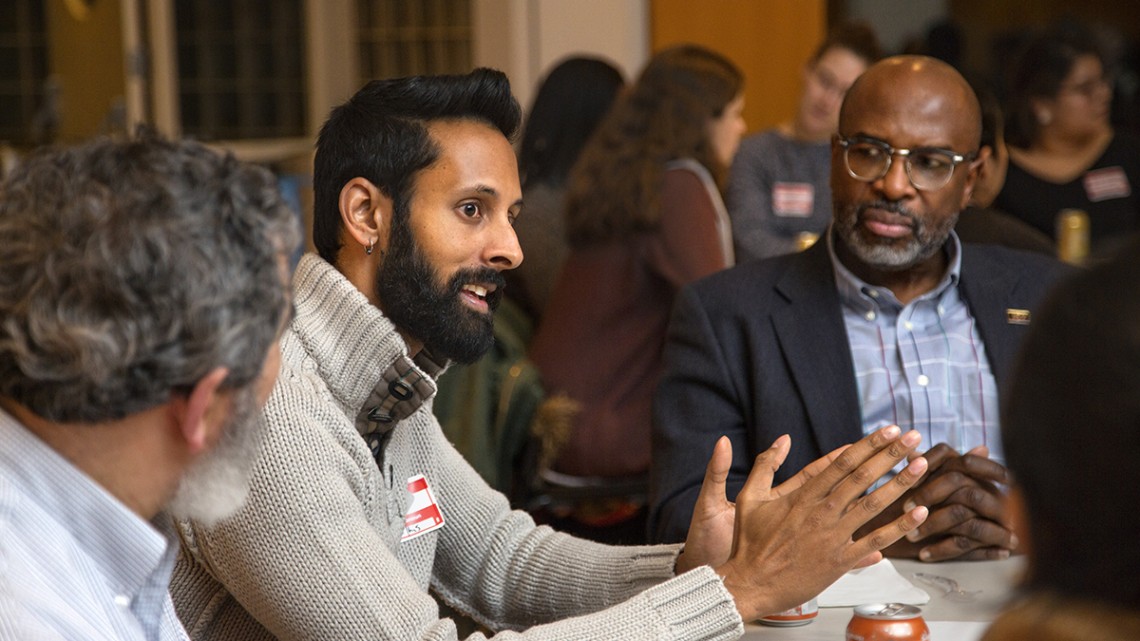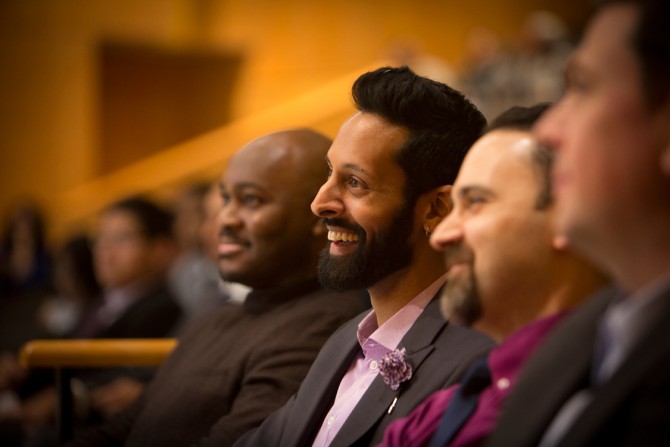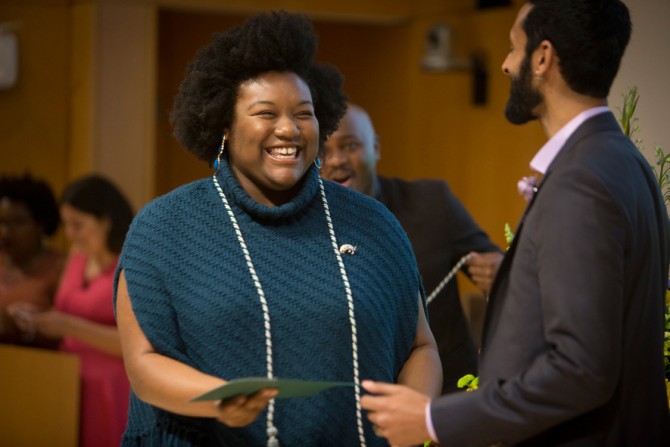
Dean of Students Vijay Pendakur chats with colleagues at a 2017 "Breaking Bread" campuswide conversation about freedom of speech on campus.
Vijay Pendakur seeks to transform the student experience
By Joe Wilensky
Vijay Pendakur, a practitioner and scholar of diversity and inclusion, became Cornell’s Robert W. and Elizabeth C. Staley Dean of Students in January. The mission of the Office of the Dean of Students, a unit of Student and Campus Life, is to enrich student life by supporting personal, social and intellectual growth and providing students opportunities through service, teamwork, stewardship, leadership and wellness.
How do you define your role as Cornell’s dean of students?
The dean of students, as well as the staff on my team, focuses on key issues in the student experience: safety, wellness, diversity and belonging. As the dean, I am charged with serving as one of the campus leaders on crisis management while also contributing thought leadership for the Division of Student and Campus Life in shaping the student experience for all Cornell students, allowing them to develop a genuine sense of belonging.
I work closely with the vice president for student and campus life, Ryan Lombardi, in finding more ways to create common experiences for students to be a part of.
How does belonging to a diverse community connect all Cornellians?
Fifty years ago, it was a lot easier for higher education to create what we call a sense of belonging in its student body, because the student body was significantly more homogenous. Back then, on average, if you were at an elite institution in this country, your student body was heavily male, white and socio-economically privileged. Cornell has been somewhat exceptional in this regard, with our founding mission challenging us to strive for greater racial, gender and socio-economic diversity than many of our peers, since our earliest days.
That homogeneity is part of American higher education history; that is the history from which we emerge. But since the 1960s, there has been a huge effort to diversify the collegiate student body, and, especially in the last 15 years at the Ivies, you’ve seen a dramatic sea change in our compositional diversity.
These are tectonic shifts. I don’t think anyone could have imagined the level of diversity we have here at Cornell now in the undergraduate student body. From international students, to domestic students of color, to first-generation college students, to women in STEM majors, to Pell-eligible students, Cornell students exemplify what it means to be a leading institution in a cosmopolitan society.
Once you change your “who” you have to change your “how.” It’s just a basic reality with education: how you construct a learning environment has to correspond with the learners and their life experiences. And we have changed our “who” – but we haven’t fundamentally changed our “how.”
The task ahead of us is to harness the opportunity we have with this compositional diversity. Research from the private sector shows that if you harness the diversity on a working team, in a lab, on a corporate sales team or on an innovation group in an engineering firm, you end up with a better outcome, a better work product, a better set of ideas, better R&D. It’s the same thing for a college campus.
If we don’t change our “how,” then the value of our compositional diversity is not fully realized. If we’re willing to change our “how,” then that diversity can become our greatest strength.
Have you been able to serve all students, including those who do not identify as members of minority or marginalized groups?
This fall I’m going to be heavily visible and participating in a variety of activities that do not have an explicit diversity and inclusion focus. I’m trying to make this role the dean for all students by not only engaging in diversity and inclusion efforts, but also in thinking about how to be part of the broader student experience.
But it’s also really important not to frame diversity and inclusion as only pertinent to those who carry marginalized identities.
The reason that you’ll hear me talking about the concept of belonging a lot is because it transcends identity. It really gets down to the human experience of what can drive a vibrant, happy and, ultimately, a transformative college experience.
When people feel like they belong in a community, all kinds of good things happen. Their resilience goes up, which allows them to overcome obstacles; their ability to advocate for themselves goes up because they feel like they have a voice; their ability to take healthy risks and make new friends, and take risks across difference goes up, so they have more intergroup contact. For people to feel like they belong, however, their identities have to be respected and they have to feel safe being themselves.
When I think about creating inclusive environments, I don’t only think about this from a standpoint of race or sexuality or socio-economic class. I also think about this from a standpoint of mental and emotional health as well. It’s no surprise that Cornell Minds Matter, an organization working on positive psychology, public health and creating a culture of wellness and resiliency at Cornell, is housed in the dean of students’ office. I’m also particularly proud of our Care and Crisis Management operations in the dean’s office, which provide direct assistance to students who encounter a crisis during their time at Cornell. The Crisis Management program is marking its 25th anniversary this year, which is a real milestone for how we demonstrate a deep commitment to student success at this university.
How will you measure and assess your success?
One of the great data sets we have is Cornell’s participation in the PULSE [Perceptions of Undergraduate Life and Student Experiences] survey, which happens every two years. It offers longitudinal data and a large, nuanced data set, which is always really helpful to see emerging trends. I’m interested in going beyond our compositional diversity of who’s here; I want to understand the experiences of those groups. Do all Cornell students enjoy the same level of satisfaction with their Cornell experience? Who’s participating in what kinds of experiences? And then there’s assessing what we call “belonging” – that is a little bit harder to determine, but there are new tools coming out. We are participating in a longitudinal study that’s being led by the University of Texas, Austin, to measure belonging in Cornell students.
In your first six months here, what have you learned about Cornell?
A lot of my time is spent with students directly. Cornell students are some of the brightest and most ambitious students I’ve ever had the pleasure of working with. They have enormous capacity for thinking about ideas in really complex and sophisticated ways, engaging in dialogue across difference and committing to action.
I’ve also learned that our faculty often choose Cornell because research is a core value here, and so is student engagement and really high-quality teaching. That’s exciting because when I look at creating a transformative student experience, it can’t be only inside the classroom or only outside the classroom. It has to be high quality in all the places students experience Cornell, and I feel like I have amazing faculty partners on this project.
There is a real sense of concern, in terms of the campus climate right now, among students about what’s happening in our world. Cornell students are very attuned to national and global politics, and feel a strong sense of urgency around issues of civic engagement. They’re not using this as four years to focus on the books and ignore the world – there’s an electrifying culture of real-world engagement here.
That means our students are living in our national climate – and the national climate right now is pretty tense.
It is difficult for our young people to look around and see polarization, toxicity and a culture of public shaming, even from the top leaders of our country. … Dialogue with civility and robust, fact-based discourse is not being modeled very effectively on the public stage right now. And the dualism of our world – where you’re either right or wrong, you’re either with us or against us – is very hard on emerging adults who, when confronted with those kinds of binary choices, might actually re-create those same behaviors on our campus. In my experience working with students as they ask big questions of themselves and the world, this is a very important and challenging moment.
How can alumni, parents and friends support student life?
One of the things about Cornell that I’ve been really impressed with is how involved our alumni community is with our students. I’ve never been at a campus where the alumni are this committed. I don’t mean just giving back of treasure – and our alumni are extraordinarily generous with their financial means. I also mean giving of time and talent. The number of alumni who come back to Ithaca to work with our students to give guest lectures, to do mentoring, to do career coaching is really significant and makes a massive difference in how our students are able to synthesize their theoretical knowledge into practical real-world applications. And that is probably the most potent investment they can make.
Media Contact
Get Cornell news delivered right to your inbox.
Subscribe

